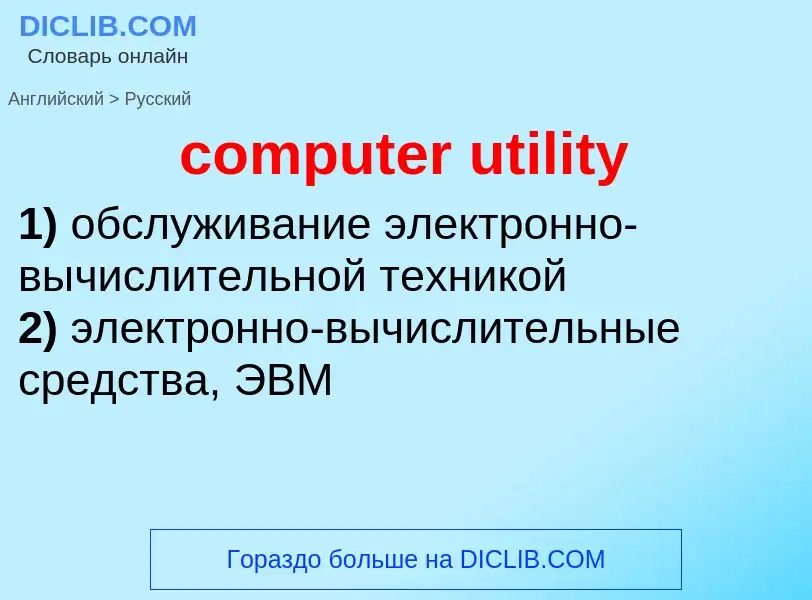ترجمة وتحليل الكلمات عن طريق الذكاء الاصطناعي ChatGPT
في هذه الصفحة يمكنك الحصول على تحليل مفصل لكلمة أو عبارة باستخدام أفضل تقنيات الذكاء الاصطناعي المتوفرة اليوم:
- كيف يتم استخدام الكلمة في اللغة
- تردد الكلمة
- ما إذا كانت الكلمة تستخدم في كثير من الأحيان في اللغة المنطوقة أو المكتوبة
- خيارات الترجمة إلى الروسية أو الإسبانية، على التوالي
- أمثلة على استخدام الكلمة (عدة عبارات مع الترجمة)
- أصل الكلمة
computer utility - ترجمة إلى الروسية
2) электронно-вычислительные средства, ЭВМ
2) практичность, выгодность || экономически выгодный, рентабельный
3) мат. функция полезности
4) pl предприятия общественного пользования, коммунальные предприятия
5) pl коммунальные услуги; коммунальные службы
6) pl акции и облигации предприятий общественного пользования
7) универсальный, общего назначения
8) дешёвый, невысокого качества
- utility of money
- absolute utility
- acceptable utility
- additive utility
- aggregate utility
- cardinal utility
- computer utility
- consumer utility
- cumulative utility
- decreasing utility
- diminishing utility
- diminishing marginal utility
- distribution utilities
- electric utilities
- form utility
- gas utilities
- incommensurable utilities
- incremental utility
- information utilities
- marginal utility
- marginal utility of money
- maximax utility
- maximin utility
- maximum utility
- minimax utility
- municipal utilities
- ordinal utility
- ownership utility
- place utility
- possession utility
- producer utility
- public utilities
- publicly-owned electric utilities
- sampling utility
- separable utility
- service utility
- social utility
- subjective utility
- time utility
- transportation utilities
- urban gas utilities
- water utilities
تعريف
ويكيبيديا
Utility computing or The Computer Utility is a service provisioning model in which a service provider makes computing resources and infrastructure management available to the customer as needed, and charges them for specific usage rather than a flat rate. Like other types of on-demand computing (such as grid computing), the utility model seeks to maximize the efficient use of resources and/or minimize associated costs. Utility is the packaging of system resources, such as computation, storage and services, as a metered service. This model has the advantage of a low or no initial cost to acquire computer resources; instead, resources are essentially rented.
This repackaging of computing services became the foundation of the shift to "on demand" computing, software as a service and cloud computing models that further propagated the idea of computing, application and network as a service.
There was some initial skepticism about such a significant shift. However, the new model of computing caught on and eventually became mainstream.
IBM, HP and Microsoft were early leaders in the new field of utility computing, with their business units and researchers working on the architecture, payment and development challenges of the new computing model. Google, Amazon and others started to take the lead in 2008, as they established their own utility services for computing, storage and applications.
Utility computing can support grid computing which has the characteristic of very large computations or sudden peaks in demand which are supported via a large number of computers.
"Utility computing" has usually envisioned some form of virtualization so that the amount of storage or computing power available is considerably larger than that of a single time-sharing computer. Multiple servers are used on the "back end" to make this possible. These might be a dedicated computer cluster specifically built for the purpose of being rented out, or even an under-utilized supercomputer. The technique of running a single calculation on multiple computers is known as distributed computing.
The term "grid computing" is often used to describe a particular form of distributed computing, where the supporting nodes are geographically distributed or cross administrative domains. To provide utility computing services, a company can "bundle" the resources of members of the public for sale, who might be paid with a portion of the revenue from clients.
One model, common among volunteer computing applications, is for a central server to dispense tasks to participating nodes, on the behest of approved end-users (in the commercial case, the paying customers). Another model, sometimes called the Virtual Organization (VO), is more decentralized, with organizations buying and selling computing resources as needed or as they go idle.
The definition of "utility computing" is sometimes extended to specialized tasks, such as web services.



